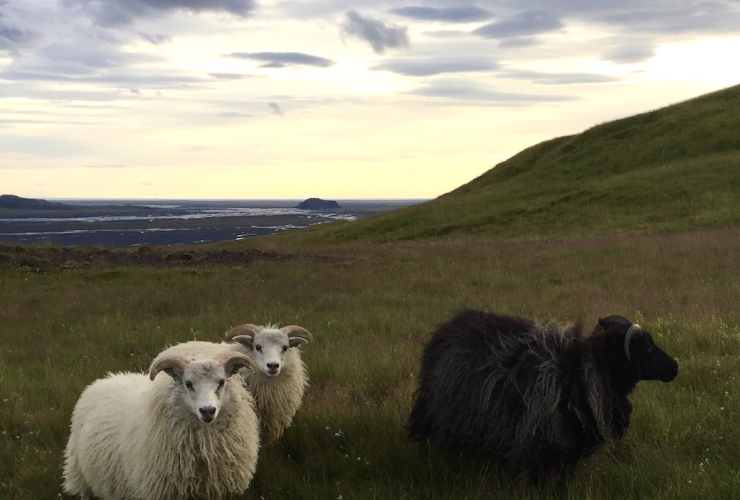Marc Fawcett-Atkinson

Journalist | Vancouver |
English
French
About Marc Fawcett-Atkinson
Marc Fawcett-Atkinson is a reporter and writer covering food systems, climate, disinformation, and plastics and the environment for Canada’s National Observer.
His ongoing investigations of the plastic industry in Canada won him a Webster Award's nomination in environmental reporting in 2021. He was also a nominee for a Canadian Association of Journalists's award for his reporting on disinformation.
Marc has previously written for High Country News, the Literary Review of Canada, and other publications on topics exploring relationships between people and their social and physical environments.
He holds an M.A. in journalism from the University of British Columbia and a B.A. in Human Ecology from the College of the Atlantic.
'I just hope everything doesn't start shutting down again'
Paul Natrall misses balmy, busy, bustling evenings serving bannock at summer festivals. That's been the norm for the Squamish Nation chef and food truck owner who specializes in Indigenous fusion cuisine. Since he opened his business in 2017, Natrall — better known as “Mr. Bannock” — has been a popular fixture at festivals and other gatherings across B.C.’s Lower Mainland.
How cheddar cheese explains Canada's dairy politics
Canada had extra cheddar in July. About 42,000 tonnes of it. That’s not unusual. The sharp, hard cheese — and a statistical benchmark for the federal government — has a long history in Canada’s almost $7-billion dairy industry. A history that’s key to understanding modern-day dairy politics.
Canadian seed growers vote against corporate merger — for now
Last Thursday, Terry Boehm breathed a sigh of relief. The Canadian Seed Growers' Association, which represents 3,500 seed growers across Canada, voted against a proposed merger with four other seed industry organizations. It was a decision Boehm, a farmer and Saskatchewan representative for the National Farmers Union, hopes will protect farmers' independence — and the integrity of Canada’s farms.
Steers, rams, and hogs: B.C.’s meat industry, by the numbers
In British Columbia, livestock is controversial. Especially killing livestock. The problem is hitting small-scale meat farmers particularly hard, Julia Smith, president of the Small-Scale Meat Producers Association and a rancher, said. They’re pinched between a regulatory maze that’s decimated both local abattoirs and the small livestock farms — and skyrocketing demand for local meat.
B.C. is updating its abattoir rules, but some advocates are hungry for more
Julia Smith is lucky. Her pigs have a date with the butcher. That was far from guaranteed, says the Merritt, B.C. rancher and president of the Small-Scale Meat Producers Association. B.C. abattoirs and butcher shops are in short supply, Smith explained, limiting the availability of local meat in the province — and recently announced changes to provincial abattoir laws might not do much.
Feds extend deadline, eligibility for COVID-19 business credit. That's good for farmers, advocates say
Even in a pandemic, seeds germinate, livestock grow — and farmers keep working. That rhythm, vital to Canada’s food supply and rural economies, belies the uncertainty farmers face from bad weather, markets — and now, COVID-19. It’s an uncertainty advocates hope will ease with changes to the Canada Emergency Business Account announced Monday.
Canadian farmers rely on 250,000 imported bees. This year, they almost didn't come.
Flying 250,000 bees across the Pacific is complicated. Especially in a pandemic. It’s a challenge Rod Scarlett knows well. When most international flights stopped in March, thousands of queen bees were stranded abroad.
B.C. imported $9.6M of vegetable seed last year — but that's not all bad, farmers say
Brent Harris’ bean crop relies on South American seed. He’s not alone. Commercial vegetable growers in the province like Harris — who owns an organic bean, pea, barley and potato farm in Delta, B.C. — depend on seed from around the world. And despite a pandemic-induced global rush on seed, that might not change.
Where in the world do B.C. farmers get their seed?
Brent Harris’ farm holds a world map — a map that grows. That’s because the Delta, B.C., pea, bean and potato farmer’s seeds were grown on farms from Chile or China — and places in-between.
The dirt on transformational soil and how it could help save the world
Anastasia Fyke doesn’t have time for millennials. Sort of. The fourth-generation farmer (and a millennial herself) wants to help farmers transform agriculture from Canada’s sixth-largest greenhouse gas producer into a carbon sink. It’s an attainable goal — with enough investment. “I hear a lot of flak, especially from my own generation, blaming farmers for all these climate things,” she said.










